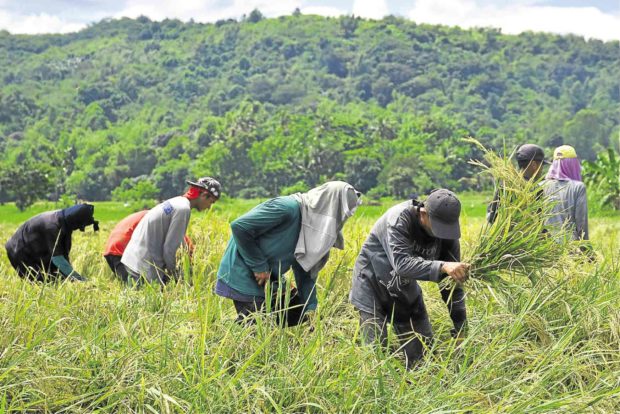
PRECIOUS GRAIN Harvesting palay is a community effort in the village of Pogomboa in Aguilar town, Pangasinan province. With the tax reform law raising production costs, consumers are expected to bear the increase in the prices of rice in the market. —WILLIE LOMIBAO
CALASIAO, Pangasinan — The tax reform law may have proven the adage that “planting rice is never fun.”
Farmers will spend an additional P1 to produce a kilogram of palay due to the Tax Reform for Acceleration and Inclusion (Train) law (Republic Act No. 10963), according to Samahang Industriya ng Agrikultura (Sinag).
At present, farmers spend P12 to produce a kg of rice but increases in the cost of farm products due to TRAIN will raise that expense to P13 to P13.50, the group said.
While the government has exempted farmers from paying irrigation water to bring down production costs, those not reached by irrigation systems have to pay for higher cost of diesel to run irrigation machines, also due to the fuel excise tax imposed by TRAIN.
The expenses start with land preparation. Farmers rent a tractor to plow the field and rent has gone up from P2,500 to P3,000 for every hectare. Another P3,000 is needed for soil leveling or fallowing using “kuliglig” (a tractor similar to a rotary tiller).
“Both machines use diesel and the additional payment goes to the increase in the prices of fuel,” said Ponciano Onia, a farmer-trader from Umingan town in Pangasinan province.
Farmworkers have asked for higher pay for pulling palay seedlings from the seedbed. They have asked for a P3 fee, up from P1.50 for every “bigkis,” or a bundle of seedlings they dig up and transplant.
Around 600 bundles are needed to fill a hectare. While there are already machines for transplanting rice, these are not popular yet and manual labor is still the norm.
Labor cost
Ten laborers for every hectare are needed to transplant palay seedlings, Onia said. They are paid P5,000 if they are not served lunch, and P4,000 if meals are included.
Fortunately for farmers, prices for certified seeds have not gone up yet. A bag of 40 kg is sold at P1,200.
They have yet to feel the impact of TRAIN on fertilizers and pesticides, according to Rosendo So, Sinag chair. But farmers may need to add P5 more for freight cost due to fuel price hike, he said.
Chemical fertilizers are mostly imported and are controlled by world prices.
For every hectare, farmers use two bags of urea (P850 per bag) and eight bags of Triple 14 (nitrogen, potassium and phosphorus), costing P950 a bag.
Some fields need 16-0-0 or potassium (P760 per bag) and use it in combination with other fertilizers, Onia said.
Machines and carabaos
During different stages in the cropping season, farmers spray pesticides and herbicides which entail additional expenses.
At harvest time, mechanical harvesters are widely used in Pangasinan. “It takes only a day to harvest a hectare of palay and the grain is already bagged right after harvesting,” Onia said.
Carabaos still have a use in the scheme of things, he said. They pull the sleds which are used to transport bags of palay from the field to the highway, where traders wait. The rent for a carabao is P2,000 for each hectare it helps harvest.
Milling palay to rice also costs more due to high electricity rates because of TRAIN, So said.
The National Food Authority (NFA) buys palay at P17 a kg, which means farmers net P5 for every kg they produce. This is why farmers would rather sell palay to private traders who buy at P19 (freshly harvested) and P23 (dry) a kg.
In the end, consumers will bear the brunt of the steeper cost of rice, farmers said.